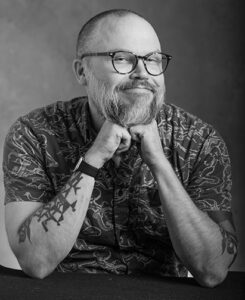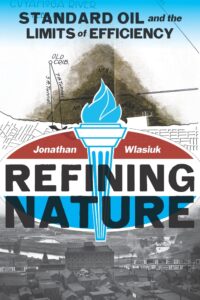Jon Wlasiuk: An Alternative History of Cleveland
January 21, 2025 by David
Filed under Non-Fiction, WritersCast
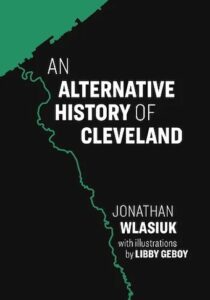 An Alternative History of Cleveland – Jon Wlasiuk – Illustrated by Libby Geboy – Belt Publishing – Paperback – 9781953368799 – 244 pages – paperback – $19.95 – October 15, 2024
An Alternative History of Cleveland – Jon Wlasiuk – Illustrated by Libby Geboy – Belt Publishing – Paperback – 9781953368799 – 244 pages – paperback – $19.95 – October 15, 2024
This is a terrific book published by the very fine independent Belt Publishing (now part of Arcadia Publishing, a company that specializes in books about locales). Belt has long focused on books about the midwest, specifically the rust belt from which its name derives. One of its goals has been to dispel myths about the midwest and its places, not just for outsiders, but for the people who live there themselves who often do not realize the depth of the places they inhabit.
Jon Wlasiuk’s Alternative History of Cleveland is unusual and surprising. Based on the title of the book, I was expecting to be reading a Howard Zinn style political history of the city, but what Wlasiuk has done is to write a much more inventive, somewhat personal, and thoroughly engrossing narrative that takes us from the geological underpinnings of northast Ohio, through the comings and goings of indigenous peoples, and into the modern historic era, weaving together ecology, sociology, geography, arts and culture, to open our eyes to a place that so many have failed to fully comprehend. The theme throughout is that city and nature are thoroughly intertwined, and there are many people today working to make Cleveland a better place for people and nature to thrive together. Wlasiuk’s vision of the city and its environs is one that all of us can relate to, wherever we ourselves inhabit the earth. It’s a wonderful book I can highly recommend.
Talking with Jon about this book was rewarding and enjoyable for me – I hope you will feel the same after listening to this episode.
Jon Wlasiuk was born in northwest Ohio and earned a PhD in environmental history from Case Western Reserve University in Cleveland. He has taught at colleges throughout the Great Lakes region, and now lives in the Slavic Village neighborhood.
Illustrator Elizabeth (Libby) Geboy was born and raised in Wisconsin, and lives in Colorado. Her illustrations translate favorite subjects in the natural world, specifically food, flora, and fauna into art.
Podcast: Play in new window | Download
Anders Dunker: Rediscovering Earth
May 18, 2021 by David
Filed under Non-Fiction, WritersCast
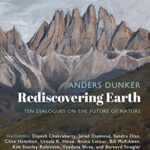 Rediscovering Earth: Ten Dialogues on the Future of Nature – conversations with Anders Dunker – OR Books – 9781682195086 – Paperback – 240 pages – $23 – ebook versions available at lower prices
Rediscovering Earth: Ten Dialogues on the Future of Nature – conversations with Anders Dunker – OR Books – 9781682195086 – Paperback – 240 pages – $23 – ebook versions available at lower prices
Thinking about how to think about climate, earth, humans on it, and the future, are major challenges for all of us who care about the future of our planet. It may be that most of us alternate between despair and rage, and even with an optimist’s outlook, we have trouble dealing with the sheer scope of what is happening to our surroundings (I think using the words “environment” and “earth” and “planet” has now become counterproductive).
I am constantly searching for writing, whether it is in books, online or in magazines, that will offer me constructive perspectives, different and hopefully better conceptual frameworks than those we have developed, toward making it possible to be both continually engaged and continually energized. I don’t usually feel I can do that on my own.
Anders Dunker’s collection of conversations with some of the deeper thinkers about the future and us in it, turns out to be very useful. The diverse viewpoints, the language of thoughtfulness and care, the commitment to inquiry, are all inspiring elements of this short book. And with such a diverse set of outlooks, it is possible to not lose sight of the core reason for this book to exist – to inspire hope.
Dunkers poses this question: “if we know that we are destroying the planet, our habitat, why do we continue to do it?” His dialogues attempt to investigate this question, and thereby come to some sense of how we might go forward, not ourselves alone, but the nature that we rely on, together.
This is the challenge we face right now. The challenge will be different in a few years, the unfolding story will force a reckoning. For now, those who read the stories in Rediscovering Earth will be able to come to a better sense of what we can and must do together in this moment.
Dunkers proposes that our future, nature itself, will be based on how we navigate the realm of culture, including philosophy, art and literature, the groundwork of our being, as much as or more than in scientific and technological matters. In order to act, we must redefine ourselves, become truly planetary citizens, and recognize how we are all connected, and then act upon, from that, understanding.
We had a terrific conversation, not only about the book and the contributors to it, but about how we will uncover the future and live in it together. A very hopeful experience. I came away from our talk fully energized, and feeling stronger.
Anders Dunker bio (from his website): Born in Norway, raised in the countryside in a family much dedicated to wildlife and nature. Educated in humanistic subjects and Cultural History at the University of Oslo, with Philosophy, Comparative Religion and Comparative Literature as main subjects. Teacher of Aesthetics and other subjects at the University of Oslo, Philosophy and Cultural History in Rome and Barcelona.
Senior lecturer at Kulturakademiet (Norwegian private college) for 10 years, now writer for acclaimed Norwegian & international newspapers and magazines (Le Monde diplomatique, LA Review of Books, NyTid, Vagant, Samtiden, Modern Times Review, Agora). Board member of the Norwegian Writers’ Climate Campaign,
Series Editor of Futurum Collection at Existenz Publisher (Norway) and Editorial Board Member at Technophany, a journal for Philosophy and Technology.
His current book projects include an essay on the future as seen from California and a volume on Peter Sloterdijk’s philosophy. Anders currently lives with his wife, an environmentalist and animalist singer, in Los Angeles, California. He is also a plein air painter.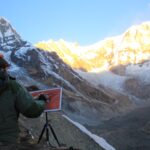
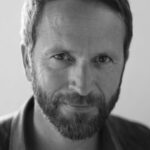
From Dialogue One: “The Rediscovery of the Earth—with Bruno Latour”
Anders Dunker (AD): Historically, the age of discovery is over. Are we none the less in a new age—an age of rediscovery—that can lift our spirits and propel us past the nagging feelings of tragedy?
Bruno Latour (BL): Well, it is my way of being optimistic. It is my way of not taking part in the sense of doom. Scientifically and technically, it is perfectly rational to be a pessimist, but I don’t think it makes much sense politically. Optimism has nothing to do with technoscience—DNA plus cognitive science plus robots plus outer space. Instead it is connected with exploring the world we thought we knew. I will borrow the term from you and call our time period an age of rediscovery, even if it is grandiose. What we call local has quite a different meaning in relation to Gaia than it previously had. It now has many different dimensions. The rediscovery of a place is in some ways a cliché—since ecologists have been talking about the same thing for years—but this concept also leads to a different way of framing the world, it leads to another geometry, so to speak. Water gets another meaning. Ice gets another meaning. Industry is considered in relation to the amount of CO₂ in the atmosphere. We see things in new ways. Antibiotics have a different kind of globalization than weeds, for example.
AD: Traditionally, the concept of the local has had a flavor of subjectivity—existence circumscribed by the immediate horizon—in contrast to the scientific gaze, which purports to see everything as if from outer space?
BL: And here lies the error. The local is objective. The gaze from inside the critical zone is completely objective, it is just objective in a different way. What we see is real, but this reality only becomes visible if we learn what different parties are up to, what they need, what they want, what they can accomplish.
Buy the book directly from the publisher, OR Books.
Podcast: Play in new window | Download
Ben Goldfarb: Eager: The Surprising, Secret Life of Beavers, and Why They Matter
November 6, 2018 by David
Filed under Non-Fiction, WritersCast
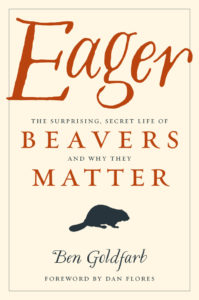 Eager: The Surprising, Secret Life of Beavers, and Why They Matter – Ben Goldfarb – Chelsea Green – 304 pages – Hardcover – 9781603587396 – $24.95 – July 5, 2018 – ebook editions available at lower prices
Eager: The Surprising, Secret Life of Beavers, and Why They Matter – Ben Goldfarb – Chelsea Green – 304 pages – Hardcover – 9781603587396 – $24.95 – July 5, 2018 – ebook editions available at lower prices
This amazing book completely captivated me from beginning to end. Environmental journalist Ben Goldfarb, a Yale Forestry School graduate, is a natural storyteller, and writes with a warm and inviting style. In Eager, he demonstrates how the actions of a single mammal species so thoroughly affects the ecology of rivers and landscapes we have come to take for granted, without understanding the effects of these amazing and inventive rodent environmental engineers.
Beavers have had wide-ranging effects on the landscape for aeons. When Europeans arrived in North America, beavers were everywhere, and the very nature of rivers was completely different than they appear to us today. Slowed in flow, and wildly marshy, because of all the beaver dam building, rivers were rich and varied environments for many species of wildlife, insects and plants.
And yes, beavers are rodents – but very special and important to us all. They were trapped and hunted for their fur in the 18th and 19th centuries. That demand created a hunting and trapping economy that caused beavers to be virtually obliterated from most parts of the United States. And their disappearance literally changed our landscape, allowing the open flow of rivers, thereby causing erosion and the loss of healthy habitat over many years. The river landscapes most of us have seen in our lifetimes simply did not exist 400 years ago.
Beavers have not been appreciated, much less loved, by farmers and ranchers in North America, and typically not understood or appreciated by most of us. But now, in a time of climate change, increasing heat, more drought, and lacking the money or will to build yet more infrastructure, beavers may represent a viable alternative to restoring the health of many river systems around the country.
Ben Goldfarb’s wide ranging and witty book teaches us a great deal about beavers, personalizes their appeal, and shows us why so many people are enthusiastic about beavers now, yet he also shows how difficult it is to change the way we think about beavers and what they can do to make our world a better place. I hope this book adds more than a few beaver enthusiasts to the world, and helps change the way we co-exist with beavers in the future.
It’s impossible to read this book and not come away with a changed perspective. And I really enjoyed speaking with Ben about the book and about his experiences with beavers around the world. Overall, this book is great fun, and I am happy to recommend Eager to readers of all interests.
“Eager takes us inside the amazing world of nature’s premier construction engineer…and shows us why the restoration of an animal almost driven to extinction is producing wide-ranging, positive effects on our landscapes, ecology, and even our economy.”―National Geographic
“This witty, engrossing book will be a classic from the day it is published.” –Bill McKibben, author of The End of Nature
Ben Goldfarb is an environmental journalist and also a writer of fiction. His writing has been published in Science, Mother Jones, The Guardian, High Country News, Audubon Magazine, Modern Farmer, Orion, Scientific American, and many other magazines and journals. He has a masters degree from the Yale School of Forestry and Environmental Studies, and was a 2018 North American Congress for Conservation Biology journalist fellow. You can learn more about his work at his website here.
If you are interested in learning more about beavers or becoming a beaver supporter, there are many organizations around the country. The Beaver Institute is a good one to start with.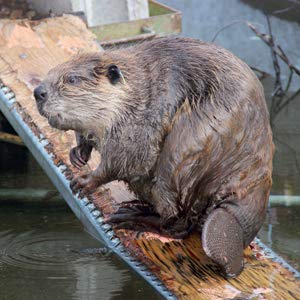
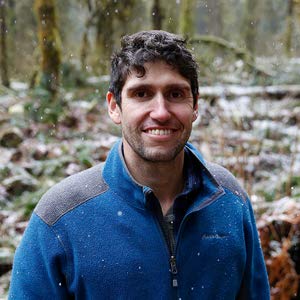
Podcast: Play in new window | Download
David George Haskell: The Forest Unseen
February 16, 2013 by David
Filed under Non-Fiction, WritersCast
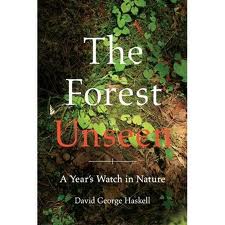 9780143122944 – Penguin – paperback – $16.00 (ebook versions available, hardcover also)
9780143122944 – Penguin – paperback – $16.00 (ebook versions available, hardcover also)
Most of us are not very good at seeing the details in the world that surrounds us. We’re in a hurry, we’re overloaded with information, and we don’t really have the patience for the kind of looking that it takes to absorb and think about that kind of information.
The brilliant geographer, Carl Ortwin Sauer observed this about naturalists:
“Much of what [they] identify and compare lies outside of quantitative analysis. Species are not recognized by measurements but by the judgment of those well experienced in their significant differences. An innate aptitude to register on differences and similarities is joined to a ready curiosity and reflection on the meaning of likeness and unlikeness. There is, I am confident, such a thing as the “morphologic eye,” a spontaneous and critical attention to form and pattern. Every good naturalist has it…”
This is a fairly apt description of the work that naturalist David George Haskell undertook before writing The Forest Unseen: A Year’s Watch in Nature. And what a beautiful book it is!
Haskell is a biologist at the University of the South in Sewanee, Tennessee. He located a small piece of old growth forest nearby (old growth forest typically still exists in relatively tiny pockets in places where the terrain was too difficult for loggers to get into). With a certain nod to Buddhism, Haskell found a one meter by one meter square piece of forest he termed his mandala, and committed to spending a full year in close observation of this tiny sampling of an original and relatively undisturbed ecosystem.
Over the course of that year, he intrepidly sat and watched, and sometimes closely examined with a magnifying glass, what happened in his square meter of land. Each time he visited what ultimately became his meditation place, he recorded what he saw, and then researched and wrote about what had happened during that day. Of course this sounds mundane and almost plodding. And in lesser hands, this would just be a perhaps valiant exercise in close observation,. But it’s in the writing and the meditative exploration that Haskell was able to transform his seen experience into magical prose explorations of nature and what it means to us.
Finding a tick on him leads to a discourse on the life cycle of the tick that is worth re-reading several times. Hearing a chickadee in winter leads him to write about the amazing ways that these little birds survive the winter. Finding a golf ball in his sacred space (this may be a piece of wilderness but it’s boundaries by a nearby golf course) provides Haskell with the opportunity to explore the meaning of what is the definition of “natural” and the relationship of humans to nature.
David Haskell writes beautifully about nature, but as well, writes brilliantly about the ideas that closely examining the natural world inspire in an intelligent and perceptive human being. You can read this beautiful book simply to learn a great deal about a wide range of creatures and plants that we often take for granted, how an ecosystem works across time and changing seasons, and how in fact any of us could learn more by close observation. You can also read this book simply for the sheer beauty of the writing, and the brilliance of its descriptive passages. Haskell has extended beyond scientific or nature writing with a poetic and spiritual grace and the power of contemplative thought to create something very special and uniquely his own.
This is a book I have been buying frequently to give to friends and family (I am related to two active biologists), and recommend to everyone as one of my favorites. It was a great pleasure to talk to David Haskell about his work. I’ve been enjoying reading his blog, called Ramble, now on a regular basis, it’s a wonderful journey for anyone interested in the natural world and how to see it clearly.
Haskell holds degrees from the University of Oxford (B.A. in Zoology) and from Cornell University (Ph.D. in Ecology and Evolutionary Biology). He is Professor of Biology at the University of the South, where he has served both as Chair of Biology and as an Environmental Fellow with the Associated Colleges of the South. He is a Fellow of the American Council of Learned Societies and was granted Elective Membership in the American Ornithologists’ Union in recognition of “significant contributions to ornithology.” He served on the board of the South Cumberland Regional Land Trust, where he initiated and led the campaign to purchase and protect a portion of Shakerag Hollow, where the The Forest Unseen is set, a forest that E. O. Wilson has called a “cathedral of nature.” David Haskell lives in Sewanee, Tennessee, where he and his wife, Sarah Vance, run a micro-farm (with goat milk soaps available for purchase at Cudzoo Farm’s pretty cool website).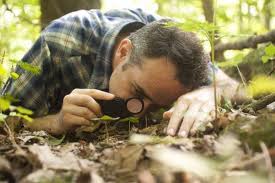
Note to listeners – I read this book in its lovely Viking hardcover edition, this interview is being posted in February, 2012; as of the end of March 2012, the paperback edition will be available. The cover here is of the hardcover edition.
Podcast: Play in new window | Download
David Gessner: My Green Manifesto: Down the Charles River in Pursuit of a New Environmentalism
December 3, 2011 by David
Filed under Non-Fiction, WritersCast
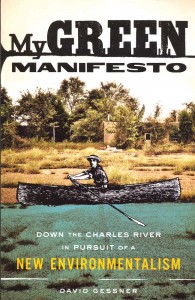 978-1-571313-24-9 – Milkweed Editions – paperback – $15 (ebook editions available)
978-1-571313-24-9 – Milkweed Editions – paperback – $15 (ebook editions available)
David Gessner is a sort of post-modernist environmentalist. He’s written a number of books that celebrate the natural world and the wild, and he is a terrific writer capable of transcendent prose and has the keen observer’s eye that anyone writing about nature must have. But he understands the difficulties and contradictions that suffuse contemporary civilization. And he has a sense of humor and irony (which environmentalists are not always known for).
In My Green Manifesto, he addresses a major issue that affects so many of us who feel strongly about the arc of modern civilization, that its inertia is overwhelming, the problems so great, the solutions so elusive, and the efforts of individuals so ineffectual as to make us lose all hope of being able to make meaningful change.
The book takes us through Gessner’s journey from the headwaters of the Charles River to its end in Boston’s urban harbor. His trip is made for the most part in company with a true environmental hero, Dan Driscoll, who almost single-handedly spurred the suburban and urban communities along the once highly polluted river to make significant changes to both restore and protect the river and riverside ecology. They travel in a leaky canoe, drink beer, sleep in tents, and enjoy the pleasures of a “limited-wild” experience.
Gessner takes heart from the work Driscoll has done, and shows us how important his practical efforts have been. “This new picture is that of a man or woman who knows how to get things done, who understands the value of momentum, of focus on a particular project. Not a shrill or dry or particularly flowery environmentalism … Someone willing to get in [a] fight and ‘Sue the bastards.’ Someone willing to stick their nose in there and feel what it’s like to get bruised. And someone willing to stay locked in that fight for years, even if it costs them emotional as well as actual capital.’’
Gessner writes with great humor and joy about the pleasures of being in nature, wherever one lives, and that is the core of his manifesto. His ideas will resonate for many who are not willing, able or equipped to spend significant time in distant wildernesses. And as a “manifesto” this book will be easy for most readers to digest and accept. Gessner’s message is positive and powerful because it is realistic and not preachy and because so many of us can relate to his experiences of the joy of being in nature and at the same time despair over the sheer extent of modern society’s environmental unconsciousness.
Gessner reminds us that it is possible to hold two seemingly contradictory ideas in our minds at the same time, that complexity and contradiction are almost facts of life, but cannot defeat us from taking action to make change. “The first idea was acceptance, the acceptance, totally without rancor, of life as it is, and men as they are … But this did not mean that one could be complacent, for the second idea was of equal power: that one must never, in one’s own life, accept these injustices as commonplace but must fight them with all one’s strength.’’
Author website here (you can find a list of all his many fine books there) Gessner’s latest book is one I am interested in reading as well. The Tarball Chronicles: A Journey Beyond the Oiled Pelican and Into the Heart of the Gulf Oil Spill chronicles his visit to the Gulf after it had passed out of the news. Not an uplifting story, I fear.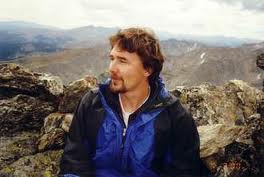
Podcast: Play in new window | Download
James Gustav Speth: The Bridge at the Edge of the World: Capitalism, the Environment, and Crossing from Crisis to Sustainability
August 30, 2009 by David
Filed under Non-Fiction
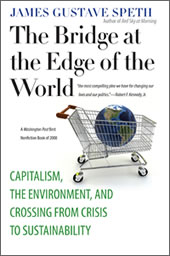 978-0300151152 – paperback – Yale University Press – $18.00
978-0300151152 – paperback – Yale University Press – $18.00
While I was reading The Bridge at the Edge of the World, I often would exclaim out loud as so many of the ideas the author talks about are ones I believe in and feel are important to the dialog about the future of our planet. This is an important book that should be widely read, discussed and used as the basis of action – and soon!
Co-founder of the NRDC, former Yale University dean, and former White House advisor James Gustave Speth has been a leader in the environmental movement for more than 30 years.
Now, faced with overwhelming evidence of galloping degradation of the planet, Speth has concluded that the environmental project—his project—has failed. No matter how hard environmentalists work, the current of destruction against which they are swimming is simply too swift. In order to preserve a livable planet for future generations, Speth argues in The Bridge at the Edge of the World that the current itself must be altered. And the current is that untouchable edifice, American-style consumer capitalism.
I found this book to be powerful and compelling and wanted to talk to “Gus” Speth about the implications of his thinking. How should we go forward when we know that the way we live today is putting us on a collision course with the natural world? How do we build new ways of living that are sustainable? And how are we going to do this in the face of so many entrenched interests that will oppose the essential changes we feel are necessary for human survival and for the preservation natural systems in a viable planet earth?
While this interview is perhaps all too brief, Speth talks in depth about some of his ideas and answers my questions with his typical incisiveness and intelligence.
Podcast: Play in new window | Download

